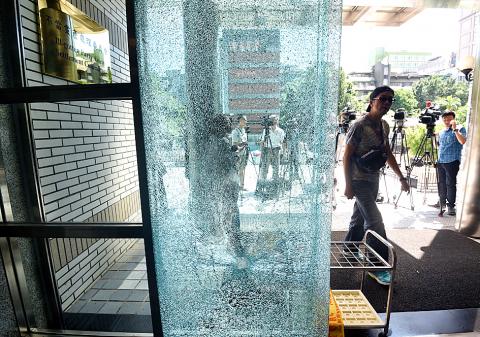Two men yesterday threw rocks at the front door of the building housing the Ill-Gotten Party Assets Settlement Committee, shattering the glass and prompting Chinese Nationalist Party (KMT) Chairwoman Hung Hsiu-chu (洪秀柱) to say that the committee should operate in “a rational and legal” manner to prevent public backlashes.
Speaking on the sidelines of an afternoon tea with China-based Taiwanese businesspeople at the KMT’s headquarters in Taipei, Hung said the committee could trigger public resistance or radical acts because of the “illegitimate manner” in which it has dealt with political parties’ assets.
“We are of the opinion that any committee should handle matters logically, rationally and legally so it does not trigger too much of a public backlash,” Hung said after reporters’ asked if the incident could drive a greater wedge between the pan-blue and pan-green camps over the thorny issue of the KMT’s ill-gotten assets.

Photo: Chien Jung-fong, Taipei Times
Police said two middle-aged men riding bicycles threw stones at the Songjiang Road building housing the committee at about 11:25am.
“We have reviewed the surveillance video and found that the two men fled toward Lane 85 of Songjiang Road immediately after the attack… We are working to apprehend the suspects as soon as possible,” said Lien Ming-chi (連銘棋), assistant supervisor of the investigation team of the Taipei City Police Department’s Zhongshan Precinct.
The pair were dressed like homeless people and appeared to be in their 40s or 50s, Lien said.
Late last night, police said they had arrested one suspect.
The incident was an “irrational act,” committee spokeswoman Shih Chin-fang (施錦芳) said as she urged the public to treat public affairs rationally.
People who have concerns about the committee are welcome to “come and communicate with us,” she said.
Asked what committee Chairman Wellington Koo’s (顧立雄) reaction was to the incident, Shih said Koo was being interviewed at the time, but appeared unruffled when told of it.
As the committee was established less than two weeks ago, not all security measures have been put in place, Shih said, adding that it would step up security, including hiring a guard.
Dismissing concerns that the incident might prompt some committee members to quit, Shih said the chance of that happening was slim, as they are all motivated by a high level of enthusiasm and the pursuit of justice and fairness.
The committee would not go easy on ill-gotten party assets just because of the incident, she said.
New Power Party Legislator Hsu Yung-ming (徐永明) asked Premier Lin Chuan (林全) why the budget for the committee office did not cover guards or police officers at the building.
Lin said the government would increase security at the committee’s office, which is in the same building as the National Development Council’s Regulatory Reform Center.
The cost of increased security would be shared by the two organizations, he said.
Additional reporting by Alison Hsiao

AGING: As of last month, people aged 65 or older accounted for 20.06 percent of the total population and the number of couples who got married fell by 18,685 from 2024 Taiwan has surpassed South Korea as the country least willing to have children, with an annual crude birthrate of 4.62 per 1,000 people, Ministry of the Interior data showed yesterday. The nation was previously ranked the second-lowest country in terms of total fertility rate, or the average number of children a woman has in her lifetime. However, South Korea’s fertility rate began to recover from 2023, with total fertility rate rising from 0.72 and estimated to reach 0.82 to 0.85 by last year, and the crude birthrate projected at 6.7 per 1,000 people. Japan’s crude birthrate was projected to fall below six,

Conflict with Taiwan could leave China with “massive economic disruption, catastrophic military losses, significant social unrest, and devastating sanctions,” a US think tank said in a report released on Monday. The German Marshall Fund released a report titled If China Attacks Taiwan: The Consequences for China of “Minor Conflict” and “Major War” Scenarios. The report details the “massive” economic, military, social and international costs to China in the event of a minor conflict or major war with Taiwan, estimating that the Chinese People’s Liberation Army (PLA) could sustain losses of more than half of its active-duty ground forces, including 100,000 troops. Understanding Chinese

SELF-DEFENSE: Tokyo has accelerated its spending goal and its defense minister said the nation needs to discuss whether it should develop nuclear-powered submarines China is ramping up objections to what it sees as Japan’s desire to acquire nuclear weapons, despite Tokyo’s longstanding renunciation of such arms, deepening another fissure in the two neighbors’ increasingly tense ties. In what appears to be a concerted effort, China’s foreign and defense ministries issued statements on Thursday condemning alleged remilitarism efforts by Tokyo. The remarks came as two of the country’s top think tanks jointly issued a 29-page report framing actions by “right-wing forces” in Japan as posing a “serious threat” to world peace. While that report did not define “right-wing forces,” the Chinese Ministry of Foreign Affairs was

US President Donald Trump in an interview with the New York Times published on Thursday said that “it’s up to” Chinese President Xi Jinping (習近平) what China does on Taiwan, but that he would be “very unhappy” with a change in the “status quo.” “He [Xi] considers it to be a part of China, and that’s up to him what he’s going to be doing, but I’ve expressed to him that I would be very unhappy if he did that, and I don’t think he’ll do that. I hope he doesn’t do that,” Trump said. Trump made the comments in the context